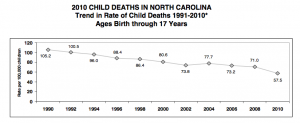Update June 7, 2013: Lawmakers amended the budget bill Friday afternoon to reinstate the Child Fatality Task Force until July 2014. Legislators decided to study the effectiveness of the task force for a year. The amendment was offered by Rep. Jim Fulghum (R-Raleigh), a retired neurosurgeon.
“Most of our task forces have a deadline,” said Rep. Marilyn Avila (R-Raleigh). “We need to take a look at this and see if it’s still effective.”
The amendment passed without objection.
By Rose Hoban
Children’s-health advocates got a jolt Friday morning when they learned the long-running legislative Child Fatality Task Force was eliminated from the House budget introduced during legislative committee meetings.
The proposed budget changes the make-up of the task force – which includes legislators and has the ability to propose statutory language – from a task force to a “state team” structure that lacks the task force’s current influence.
“Both House and Senate have indicated support on the positions [the task force has] taken on the bills we’ve put in,” said Tom Vitaglione, former head of the state’s child health division and a long-time member of the task force.
“It appears to have switched the money around to the state team, so in some ways it wouldn’t change the research aspect, but would eliminate the study commission aspect, where the task force has more direct access to the legislative process,” Vitaglione said.
“The task force has been at the vanguard of connecting legislators and issue experts, and that’s been one of the advantages, in connecting those two groups,” said Rob Thompson, head of the Covenant with North Carolina’s Children, an advocacy group.
Small change
The current task force budget is about $86,000, which includes $62,585 for a staff member, with the rest for travel and meeting expenses.
“Some members participate in meetings by phone, most come to meetings, but very few claim the mileage that they’re entitled to under the law,” Vitaglione said. “Most do it on a pro bono basis.”
Vitaglione rattled off a list of legislative accomplishments since the creation of the committee in 1991, including regulations around bicycle helmets, seat belts, strengthening the child-abuse response system, anti-poisoning measures and programs to reduce the infant mortality rate.
“There’s been a reduction of child fatality of more than 30 percent over the 20 years its been in existence,” Vitaglione said. He also said policies pushed by the task force have helped reduce the infant mortality rate.
The overall infant mortality rate in 2012 was 7.2 deaths per 1,000 live births, a tick up from a historic low of 7.0 deaths per 1,000 in 2010. North Carolina’s infant mortality rate continues to leave the state in the bottom of national rankings.
This year, the task force pushed measures making their way through the House and Senate including those to require pharmacists to enter data into the controlled-substances reporting system more quickly and measures aimed at reducing the number of accidental overdose deaths from prescription drugs.
Last year, the task force’s future was in doubt, as the body was slated to be sunsetted in 2015 under a larger bill that would have eliminated dozens of boards and commissions.
But during legislative hearings last year, lawmakers on both sides of the aisle defended the task force, including Sen. Stan Bingham (R-Davidson), who proposed extending the life of the CFTF to 2050. Eventually, the bill was amended to extend the CFTF’s life to 2019.
“The Child Fatality Task Force has proposed dozens of pieces of legislation over the past 20 years that have saved thousands of kids’ lives,” said Thompson.

